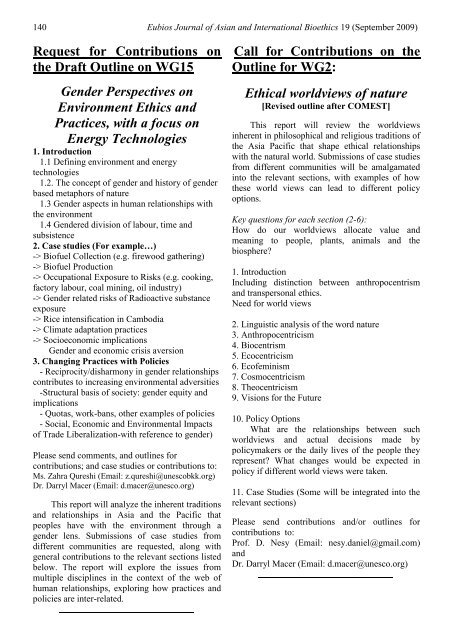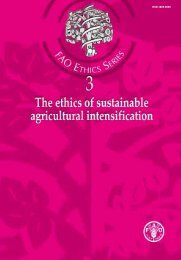Eubios Journal of Asian and International Bioethics EJAIB
Eubios Journal of Asian and International Bioethics EJAIB
Eubios Journal of Asian and International Bioethics EJAIB
Create successful ePaper yourself
Turn your PDF publications into a flip-book with our unique Google optimized e-Paper software.
140 <strong>Eubios</strong> <strong>Journal</strong> <strong>of</strong> <strong>Asian</strong> <strong>and</strong> <strong>International</strong> <strong>Bioethics</strong> 19 (September 2009)<br />
Request for Contributions on<br />
the Draft Outline on WG15<br />
Gender Perspectives on<br />
Environment Ethics <strong>and</strong><br />
Practices, with a focus on<br />
Energy Technologies<br />
1. Introduction<br />
1.1 Defining environment <strong>and</strong> energy<br />
technologies<br />
1.2. The concept <strong>of</strong> gender <strong>and</strong> history <strong>of</strong> gender<br />
based metaphors <strong>of</strong> nature<br />
1.3 Gender aspects in human relationships with<br />
the environment<br />
1.4 Gendered division <strong>of</strong> labour, time <strong>and</strong><br />
subsistence<br />
2. Case studies (For example…)<br />
-> Bi<strong>of</strong>uel Collection (e.g. firewood gathering)<br />
-> Bi<strong>of</strong>uel Production<br />
-> Occupational Exposure to Risks (e.g. cooking,<br />
factory labour, coal mining, oil industry)<br />
-> Gender related risks <strong>of</strong> Radioactive substance<br />
exposure<br />
-> Rice intensification in Cambodia<br />
-> Climate adaptation practices<br />
-> Socioeconomic implications<br />
Gender <strong>and</strong> economic crisis aversion<br />
3. Changing Practices with Policies<br />
- Reciprocity/disharmony in gender relationships<br />
contributes to increasing environmental adversities<br />
-Structural basis <strong>of</strong> society: gender equity <strong>and</strong><br />
implications<br />
- Quotas, work-bans, other examples <strong>of</strong> policies<br />
- Social, Economic <strong>and</strong> Environmental Impacts<br />
<strong>of</strong> Trade Liberalization-with reference to gender)<br />
Please send comments, <strong>and</strong> outlines for<br />
contributions; <strong>and</strong> case studies or contributions to:<br />
Ms. Zahra Qureshi (Email: z.qureshi@unescobkk.org)<br />
Dr. Darryl Macer (Email: d.macer@unesco.org)<br />
This report will analyze the inherent traditions<br />
<strong>and</strong> relationships in Asia <strong>and</strong> the Pacific that<br />
peoples have with the environment through a<br />
gender lens. Submissions <strong>of</strong> case studies from<br />
different communities are requested, along with<br />
general contributions to the relevant sections listed<br />
below. The report will explore the issues from<br />
multiple disciplines in the context <strong>of</strong> the web <strong>of</strong><br />
human relationships, exploring how practices <strong>and</strong><br />
policies are inter-related.<br />
Call for Contributions on the<br />
Outline for WG2:<br />
Ethical worldviews <strong>of</strong> nature<br />
[Revised outline after COMEST]<br />
This report will review the worldviews<br />
inherent in philosophical <strong>and</strong> religious traditions <strong>of</strong><br />
the Asia Pacific that shape ethical relationships<br />
with the natural world. Submissions <strong>of</strong> case studies<br />
from different communities will be amalgamated<br />
into the relevant sections, with examples <strong>of</strong> how<br />
these world views can lead to different policy<br />
options.<br />
Key questions for each section (2-6):<br />
How do our worldviews allocate value <strong>and</strong><br />
meaning to people, plants, animals <strong>and</strong> the<br />
biosphere<br />
1. Introduction<br />
Including distinction between anthropocentrism<br />
<strong>and</strong> transpersonal ethics.<br />
Need for world views<br />
2. Linguistic analysis <strong>of</strong> the word nature<br />
3. Anthropocentricism<br />
4. Biocentrism<br />
5. Ecocentricism<br />
6. Ec<strong>of</strong>eminism<br />
7. Cosmocentricism<br />
8. Theocentricism<br />
9. Visions for the Future<br />
10. Policy Options<br />
What are the relationships between such<br />
worldviews <strong>and</strong> actual decisions made by<br />
policymakers or the daily lives <strong>of</strong> the people they<br />
represent What changes would be expected in<br />
policy if different world views were taken.<br />
11. Case Studies (Some will be integrated into the<br />
relevant sections)<br />
Please send contributions <strong>and</strong>/or outlines for<br />
contributions to:<br />
Pr<strong>of</strong>. D. Nesy (Email: nesy.daniel@gmail.com)<br />
<strong>and</strong><br />
Dr. Darryl Macer (Email: d.macer@unesco.org)

















